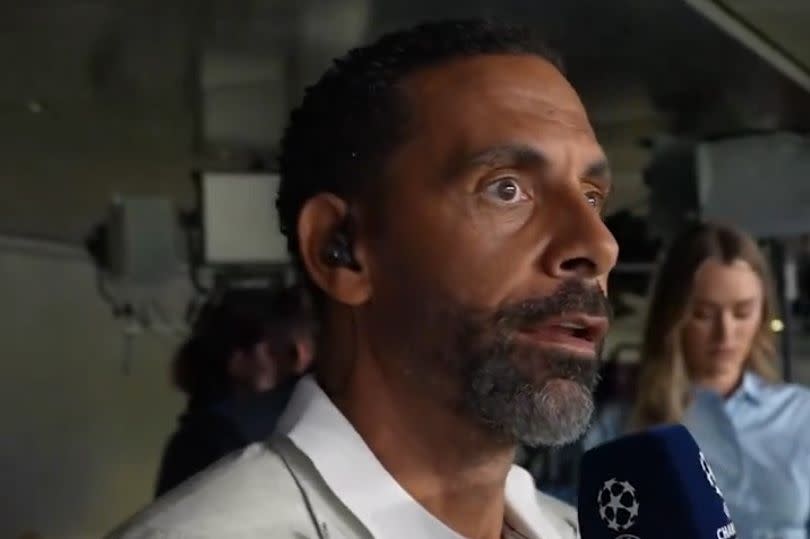Rio Ferdinand gets outcome he wanted but Virgil van Dijk and other Liverpool greats know he is wrong

Everybody had seen it many, many times before. And for Liverpool supporters watching at home and Jurgen Klopp viewing high in the Wembley stands, it made for particularly painful viewing.
Having rode their luck and been reliant on the failures of others to capitalise on opportunities, Real Madrid ruthlessly and economically did what was required to become European champions for the 15th time on Saturday evening.
The way Carlo Ancelotti's side overcame Borussia Dortmund was eerily and wearily similar to the manner in which Liverpool were seen off in Paris two years earlier, the method of operation long ingrained in the Spanish side.
READ MORE: 'Let's not overhype' - Warning sent over Liverpool winger ahead of major move
READ MORE: Arne Slot assistant manager drops future hint as Liverpool confirmation wait goes on
However, what wasn't quite so expected was one reaction as Vinicius Jnr raced on to a pass from Jude Bellingham before scoring Real's second goal to clinch the game.
"Ballon d'Or, Ballon d'Or, Ballon d'Or, Ballon d'Or, Ballon d'Or, Ballon d'Or, Vinicius Jnr has just taken the Ballon d'Or," exclaimed former Manchester United defender Rio Ferdinand, who was watching from the stands as part of TNT Sports' coverage of the final at Wembley.
That the clip went viral shortly afterwards perhaps highlighted what Ferdinand was aiming for, greater exposure for the brand and to make himself a talking point in an article such as this one. Job done in that regard, then.
But by choosing to instead celebrate the possible honour for Vinicius Jnr rather than confirmation of Real Madrid as a whole winning the competition, the ex-England international touched on a topic that has become a spiky talking point in the modern game - the seemingly increasing value of individual player awards.
The Ballon d'Or, of course, is the annual award presented by France Football for the past 67 years to the best player in the world, having for the earlier part of its existence been handed to the best European player and then the best player in Europe regardless of nationality. It was initially voted for by select journalists, to which it has since reverted after a brief spell in which coaches and captains of national teams were given a vote.
There will always be those footballers who are more popular than others, the chosen few who transcend the sport and become household names across the globe. Think Pele, Diego Maradona, Johan Cruyff, Zinedine Zidane. The very best of the best.
And while the likes of Cruyff and Zidane were deserving - and eligible - recipients of the Ballon d'Or, not every winner has been a household name from a famous club. Think Igor Belanov and Oleg Blokhin of Dynamo Kiev, Florian Albert of Ferencvaros and Matthias Sammer of Borussia Dortmund or, back in 1962, Josef Masopust of Dukla Prague. Each merited their award on football ability rather than popularity.
But the social media age has prompted the cult of the individual player, some football fans choosing instead to support one person rather than a team and then following them throughout their career as they move from club to club. Cristiano Ronaldo is arguably the greatest example of this, although there are others.
Indeed, the 'rivalry' between Ronaldo and Lionel Messi over who has won the Ballon d'Or the most times - Messi has eight to Ronaldo's five - has contributed most to the faux-elevation of the individual awards which, as with most arbitrarily-decided accolades, aren't worth that much unless you actually happen to win one.
Politics does play a part, with English football somewhat looked down upon for a long time. Spanish clubs have had 24 winners - 12 each for Real Madrid and Barcelona - while Italy can boast 16 and Germany nine. England have six. Stanley Matthews of Blackpool was the first recipient in 1956 but Manchester United are the only other English team to have a winner besides Liverpool, with Michael Owen claiming the award in 2001.
The Reds have had some near misses - Kenny Dalglish (1983), Virgil van Dijk (2019) and Sadio Mane (2022) all finished second while Steven Gerrard (2005) and Fernando Torres (2008) were third - but it was telling that Kevin Keegan only became a two-time winner the moment he left Liverpool for Hamburg.
Of course, international tournaments, particularly World Cups, are often a major factor when determining the Ballon d'Or. But, as Ferdinand was at pains to point out, major finals such as the Champions League play a part. So for six-time European champions Liverpool to have only one winner is curious, particularly when compared to the records of Real Madrid (15 European titles, 12 Ballon d'Or winners), AC Milan (seven European titles, eight Ballon d'Or winners) and Bayern Munich (six European titles, five Ballon d'Or winners).
But the truth is while the likes of Van Dijk and Gerrard would have welcomed the personal honour, they wouldn't have swapped it for the medals they earned while with the team. Football is a collective sport - and the cult of the individual award will never change that. Pack it in, Rio.

 Yahoo Sport
Yahoo Sport 






































